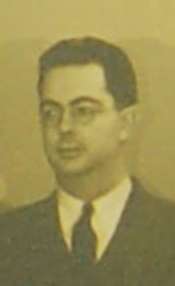J. Joseph Smith
| John Joseph Smith | |
|---|---|
 | |
| Judge of the United States Court of Appeals for the Second Circuit | |
|
In office September 2, 1960 – November 6, 1971 | |
| Appointed by | Dwight D. Eisenhower |
| Preceded by | Carroll C. Hincks |
| Succeeded by | Thomas Joseph Meskill |
| Judge of the United States District Court for the District of Connecticut | |
|
In office November 4, 1941 – September 2, 1960 | |
| Appointed by | Franklin D. Roosevelt |
| Preceded by | Edwin Stark Thomas |
| Succeeded by | William H. Timbers |
| Chief Judge of the United States District Court for the District of Connecticut | |
|
In office 1953–1960 | |
| Preceded by | Carroll C. Hincks |
| Succeeded by | Robert P. Anderson |
| Member of the U.S. House of Representatives from Connecticut's 5th district | |
|
In office January 3, 1935 – November 4, 1941 | |
| Preceded by | Edward W. Goss |
| Succeeded by | Joseph E. Talbot |
| Personal details | |
| Born |
January 25, 1904 Waterbury, Connecticut |
| Died |
February 16, 1980 (aged 76) Waterbury, Connecticut |
| Alma mater |
Yale University Yale Law School |
| Occupation | Attorney, Judge |
John Joseph Smith (January 25, 1904 – February 16, 1980) was an American lawyer, member of the United States House of Representatives, and federal judge from Connecticut.
Early life and education
Born in Waterbury, Connecticut,[1][2] Smith attended the public schools,[2] and earned his B.A. from Yale University in 1925 and his LL.B. degree from Yale's law department (later Yale Law School) in 1927.[1][2]
Career
Smith was admitted to the bar in 1927.[1] He was a research fellow at Yale Law School from 1927 to 1928.[1][2] He was in private practice in Waterbury from 1928 to 1941.[1]
Smith served in the Field Artillery Reserves from 1925 to 1935.[2]
He was elected as a Democrat to the United States House of Representatives, serving as a representative from Connecticut from 1935 to 1941 (in the Seventy-fourth, Seventy-fifth, Seventy-sixth, and Seventy-seventh Congresses).[1][2]
On October 16, 1941, Smith was nominated by President Franklin D. Roosevelt to the U.S. District Court for the District of Connecticut, to the seat vacated by Edwin S. Thomas.[1] Smith was confirmed by the Senate on October 28, 1941, and he received commission two days later.[1] Smith resigned his seat in Congress to assume his judicial post.[2] Smith served as chief judge of the court from 1953 to 1960.[1]
On January 11, 1960, Smith was nominated by President Dwight D. Eisenhower to the U.S. Court of Appeals for the Second Circuit, to the seat vacated by Carroll Clark Hincks.[1] Smith was confirmed by the Senate on September 1, 1960, and received commission the next day.[1][2]
Later life and death
Smith assumed senior status on November 6, 1971.[1][2] He remained on the court until his death in Waterbury on February 16, 1980.[1] Smith is interred at Calvary Cemetery, Waterbury.[2]
Personal life
Smith resided in West Hartford, Connecticut.[2]
Notes
- 1 2 3 4 5 6 7 8 9 10 11 12 13 "John Joseph Smith". Biographical Directory of Federal Judges. Federal Judicial Center. Archived from the original on 2017-03-29.
- 1 2 3 4 5 6 7 8 9 10 11 "John Joseph Smith". Biographical Directory of the United States Congress.
References
- John Joseph Smith at the Biographical Directory of Federal Judges, a public domain publication of the Federal Judicial Center.
- "John Joseph Smith". Biographical Directory of the United States Congress.
| U.S. House of Representatives | ||
|---|---|---|
| Preceded by Edward W. Goss |
Member of the U.S. House of Representatives from Connecticut's 5th congressional district January 3, 1935 – November 4, 1941 |
Succeeded by Joseph E. Talbot |
| Legal offices | ||
| Preceded by Edwin Stark Thomas |
Judge of the United States District Court for the District of Connecticut 1941–1960 |
Succeeded by William H. Timbers |
| Preceded by Carroll C. Hincks |
Chief Judge of the United States District Court for the District of Connecticut 1953–1960 |
Succeeded by Robert P. Anderson |
| Preceded by Carroll C. Hincks |
Judge of the United States Court of Appeals for the Second Circuit 1960–1971 |
Succeeded by Thomas Joseph Meskill |